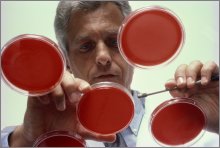Why Wouldn't Drug Companies be
Interested in this Likely Cancer Cure?
by www.SixWise.com
By repairing the damage that cancer cells cause to mitochondria,
the components of cells that convert food into energy, it
seems that a small molecule known as DCA (dichloroacetate)
may realistically offer hope of a cancer cure.
"DCA attacks a fundamental and unique property of cancer.
It puts the mitochondria back in the normal condition, and
because the mitochondria can control cell death, that also
comes back into the picture," says Dr. Evangelos Michelakis,
a professor at the University of Alberta department of medicine,
who is a key part of the team of researchers who made the
finding.
|

In lab tests, DCA was able to shrink tumors in rats
and kill human lung, breast and brain cancer cells.
|
It was previously thought that damage to mitochondria in
cancer cells was permanent, and because mitochondria are also
responsible for causing abnormal cells to self-destruct, the
cancer cells were allowed to outlive other cells and become
a majority.
"Cancer cells actively suppress their mitochondria,
which alters their metabolism, and this appears to offer cancer
cells a significant advantage in growth compared to normal
cells, as well as protection from many standard chemotherapies,"
said Michelakis.
The groundbreaking study, published in the journal Cancer
Cell, found, however, that mitochondrial damage is not permanent.
DCA was able to repair the cancer cells' mitochondria, which
in turn caused the abnormal cells to die.
DCA May Work on a Variety of Cancers and is Non-Toxic
The researchers believe DCA may treat many forms of cancer
because all of them suppress mitochondrial functions. In the
study, DCA was able to kill human lung, breast and brain cancer
cells that had been cultured in a lab without affecting normal
cells. Meanwhile, tumors in rats that had been infected with
human cancer cells shrank significantly when the rats were
fed DCA-containing water for several weeks.
|

Because DCA cannot be patented, and therefore won't
produce a profit, drug companies have little interest
in funding further research.
|
Further, because DCA is so small, it is easily absorbed by
the body. Researchers say that it could even reach areas of
the body that other drugs cannot, such as the brain.
DCA is also relatively non-toxic. It has been used to treat
patients with mitochondrial diseases for more than three decades,
with minimal side effects reported.
DCA is "Dirt Cheap" to Produce
No less exciting than the fact that DCA seems so promising
in fighting cancer is that the compound is incredibly cheap
to produce.
While this ultimately is a good thing, it's also the reason
why pharmaceutical companies have very little interest in
funding further DCA research.
DCA is currently widely available at chemistry stores, in
both liquid and powder form. It's not patented, it's not owned
by any drug company, and it's not likely to generate a huge
profit.
While the next step in the process is to run clinical trials
of DCA in people with cancer, this "will depend on funding,"
Michelakis said.
Since DCA cannot be patented and drug companies don't make
money on non-patented treatments, Michelakis adds, "industry
is not particularly interested."
Still, funding can come from other sources beyond pharmaceutical
companies, including charities, universities and governments,
and Michelakis is hopeful.
"We hope we can attract the interest of universities
here in Canada and in the United States," he says.
If you would like to know more about the University of Alberta's
efforts to test DCA in people with cancer, or if would like
to make a donation to further their studies, you can check
out their DCA
Research Information Web Site.
Recommended Reading
How
"Extremophiles" in Toxic Waste Sites May Hold the
Cure to Cancer
Shark
Cartilage: The Myths and Possible Truths of its Health Benefits
Sources
Cancer
Cell, Vol 11, 37-51, January 2007
NewScientist.com
January 17, 2007
CTV
News January 16, 2007
University
of Alberta, Department of Medicine
WhyFiles.org